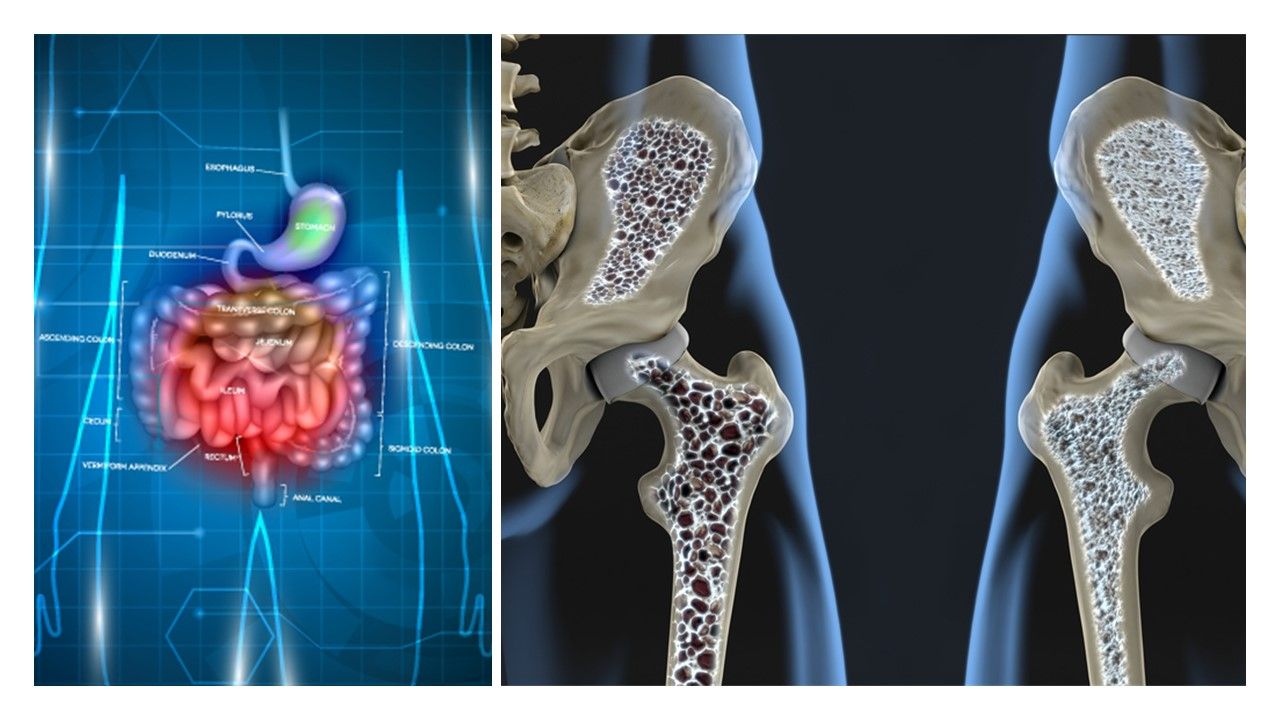Probiotics Protect Against Lumbar Spine Bone Loss in Early Menopause
Probiotic supplementation using a mix of three Lactobacillus strains naturally occurring in the human gut microbiota protects against lumbar spine bone loss in healthy, early postmenopausal women, say researchers recently writing in The Lancet Rheumatology.
(©TefiShutterstock.com), (©JavierRegueiroShutterstock.com)

Probiotic supplementation using a mix of three Lactobacillus strains naturally occurring in the human gut microbiota protects against lumbar spine bone loss in healthy, early postmenopausal women, say researchers recently writing in The Lancet Rheumatology.
Osteoporotic fractures affect every second white woman aged over 50 years, the majority of whom are postmenopausal, and result in clinical burden and increased mortality. In particular, substantial spine bone loss is observed during and early after menopause. While effective osteoporosis treatments to reduce fracture risk exist, treatment adherence is low, and bisphosphonate treatment is not recommended as a preventive therapy to women with normal bone mass. Probiotic treatments have the capacity to protect rodents from ovariectomy-induced bone loss, and there is evidence of an effect of probiotic treatments on bone health in women, but no large, randomized trial has evaluated the effect of probiotic treatment on clinically relevant lumbar spine bone loss in postmenopausal women.
“The aim of our study was to determine if treatment with a combination of three bacterial strains, with the same bacterial composition as that shown to protect mice from ovariectomy-induced bone loss, protects against the spine bone loss occurring in healthy early postmenopausal women,”
wrote the authors of the study, led by Claes Ohlsson, M.D., of Sahlgrenska University Hospital in Gothenburg, Sweden.
In this multicenter trial, 234 early postmenopausal women were randomly assigned in a 1:1 ratio to receive probiotic treatment consisting of three Lactobacillus strains (Lactobacillus paracasei DSM 13434, Lactobacillus plantarum DSM 15312, and Lactobacillus plantarum DSM 15313; 1âxâ1010 colony-forming units per capsule) or placebo once daily for 12 months. The primary outcome was the percentage change from baseline in lumbar spine bone mineral density (LS-BMD) at 12 months. Multiple secondary and exploratory endpoints were also evaluated.
Lactobacillus treatment reduced the LS-BMD loss compared with placebo (mean difference 0.71 percent, 95% CI 0.06 to 1.35). The LS-BMD loss was significant in the placebo group (–0.72 percent, −1.22 to −0.22), and no bone loss was evident in the Lactobacillus-treated group (–0.01 percent, −0·50 to 0·48). However, total hip BMD and trochanter BMD were not affected, and femoral neck BMD was reduced by probiotic treatment compared with placebo. Adverse events were similar between the two groups.
“This is, to our knowledge, the first randomized clinical trial reporting the beneficial effect of probiotic bacteria on bone mineral density at the lumbar spine.
“The menopausal and early postmenopausal lumbar spine bone loss is substantial in women, and by using a prevention therapy with bacteria naturally occurring in the human gut microbiota we observed a close to complete protection against lumbar spine bone loss in healthy postmenopausal women,” the authors wrote.
The treatment was well tolerated, but the effect size observed for the probiotic treatment on LS-BMD was of a minor magnitude compared with the effects of the first-line osteoporosis treatment bisphosphonates. Hence, the short-term regimen with the Lactobacillus strains cannot replace bisphosphonates for the treatment of women with established osteoporosis.
“Further long-term studies are warranted to explore the beneficial effects of probiotic treatment on lumbar spine bone loss in postmenopausal women,” the authors wrote. “Probiotic treatment might be useful for the prevention of lumbar spine bone loss in postmenopausal women.”
REFERENCE
Per-Anders Jansson, Dan Curiac, Irini Lazou Ahrén, et al. “Probiotic treatment using a mix of three Lactobacillus strains for lumbar spine bone loss in postmenopausal women: a randomised, double-blind, placebo-controlled, multicentre trial.”The Lancet Rheumatology. November 1, 2019. DOI:https://doi.org/10.1016/S2665-9913(19)30068-2